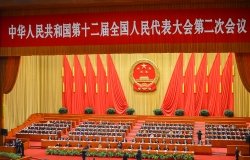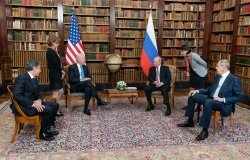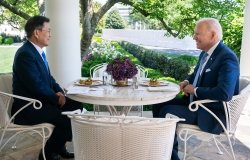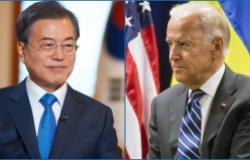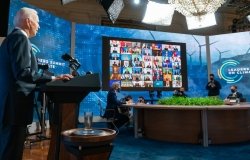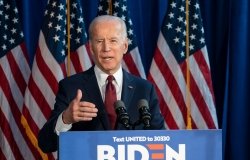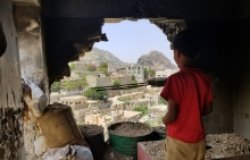They're Up and Running! Mexico's Presidential Race is On and There is a Lot on the Line
Mexico's election campaign has officially begun, and "what is clear is that in this election cycle, the country's future is once again in the balance."

On March 30, Mexico's election campaign officially began. The scene is set for a compelling race: an eminently qualified candidate representing the deeply unpopular ruling party, a third-time presidential candidate who believes he had the presidency stolen from him in 2006, a young and dynamic center-right leader who has fought off more experienced party foes, and a former First Lady who is the first independent presidential candidate in Mexican history.
For the past six months, there has been a clear front-runner, Andres Manuel Lopez Obrador (AMLO), who on his third attempt to win the presidency appears to have cracked the code on how to convince Mexico’s voters that he offers an opportunity for positive change rather than a threat. AMLO’s Morena party may also be heading towards a congressional majority, raising the possibility that he will be able to enact an ambitious legislative agenda.
The next three months, however, will likely see an intense debate among the four candidates and, although personalities clearly matter, recent Mexican electoral history shows that the content and style of the campaigns will be critically important factors. In the past two presidential elections, Mexicans have responded to both the candidates themselves and the coalitions they represent.
AMLO launched his campaign in the northern city of Ciudad Juarez, drawing on the mythology and history of Benito Juarez to present himself to the Mexican public as a representative of the nation and as a candidate who can unify society and defend national pride. His rhetoric continued to focus on fighting corruption and appointing “honest officials.”
The PAN candidate, Ricardo Anaya, has defined his campaign in terms of policy proposals and has announced that he will present a new proposal to the public each day of the electoral race. Anaya is keen to overcome the drop in public support that occurred during the past month or so as he came under attack from the ruling PRI party, who has accused him of illegal financial activity involving a real estate project. By presenting a slew of new ideas, the PAN-led coalition hopes to re-cast Anaya as a bold and innovative leader.
The third place candidate, Jose Antonio Meade of the ruling PRI party, kicked off his campaign in the city of Merida and announced to the assembled crowd that his platform will focus on presenting policies to improve education, increase support for women, public health, fighting crime and violence, and eradicating extreme poverty.
The sole remaining independent candidate, former First Lady Margarita Zavala, set the tone in her launch speech by attacking not only AMLO, but also the established parties in Mexico. Seeking to identify herself as an outsider and as an honest and capable leader, Zavala has little chance of winning the race. But she could play a spoiler role if she continues to control around 5 percent of the vote, and her campaign messages may well have an impact on the other candidates.
What is clear is that in this election cycle, Mexico’s future is once again in the balance. Three of the four candidates offer different aspects of continuity and change, whereas AMLO has presented a radical vision that seeks to undo much of the recent past. He has promised to undo some of the structural reforms that were initiated by the current PRI administration and have been highly praised internationally but have proven unpopular with Mexicans. For voters who are unhappy with the status quo, that is a compelling and attractive prospect, and the polling numbers show that AMLO has been successful thus far in persuading voters across the demographic spectrum that he offers the best chance for meaningful change. The other candidates will now turn their attention to attacking AMLO and his Morena party at every opportunity.
This will be tricky, however, as AMLO himself seems to have acquired a Teflon-like quality since his last attempt to win the presidency. Calm and assured in interviews, he projects a self-belief that this time the presidency is his to lose. His rivals will have to come up with novel and incisive tactics to dent his “non-stick” image.
As a backdrop to the battle of personalities and ideas, Mexico faces deep uncertainty in its relations with the United States. On April 1, President Trump tweeted that Mexico is not doing enough to stop the flow of drugs nor of migrants from Central America to the United States, and that he would not agree to any new NAFTA deal if the situation did not change. Although Mexicans have shown repeatedly that foreign policy issues do not drive electoral preferences, and that “anti-yanquismo” is no longer an effective campaign tool, the vehemence of Trump’s iterated attacks on Mexico cannot be ignored. All four candidates have made strong statements in the past about the need to demand respect in bilateral relations, and AMLO’s campaign launch in a border town gave him the opportunity to look northwards and state clearly that, although he sees the United States in friendly terms, the relationship must be based on mutual respect and cooperation.
The next three months will be compelling and fascinating. The Mexico Institute will follow every step of the campaign and will continue to share information on the candidates, parties, and campaigns through the Mexico Elections Blog. What’s more, our staff will be in Mexico for the election itself, interviewing, observing, and reporting from electoral ground zero. Whatever happens on July 1, this election will be historic and will set the stage for the future of Mexican development and bilateral relations with the United States.
About the Author

Duncan Wood

Mexico Institute
The Mexico Institute seeks to improve understanding, communication, and cooperation between Mexico and the United States by promoting original research, encouraging public discussion, and proposing policy options for enhancing the bilateral relationship. A binational Advisory Board, chaired by Luis Téllez and Earl Anthony Wayne, oversees the work of the Mexico Institute. Read more


